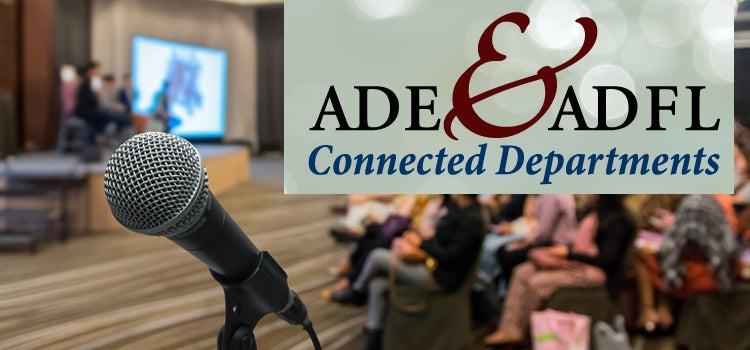
Opportunities for doctoral students through Connected Academics
A select group of students were recently invited to attend the ADE-ADFL Summer Seminar South Connected Academics: Humanistic Study and Careers Seminar in Atlanta, Georgia with ASU’s Connected Academics Program. This provided students with a unique opportunity to participate in conversations with Graduate Chairs, Directors and Program Administrators from across the region.
Michael Winans, a PhD student in the Department of English said, “Attending the ADE-ADFL Conference allowed exposure to the inner workings of both the MLA and various departments from across the U.S. and to a group of professionals and faculty who are invested in the humanities. Most impactful was a realization that this group of people really care about graduate students' education and the maintenance of the tenure-track position, all while being committed to a full understanding of the ways in which an education in the humanities can lead to rewarding careers outside of academia.”
Topics discussed at the Seminar included “Culture Change and Resistance,” “Defining Humanistic Expertise” and “The Humanities Ecosystem and Beyond.” These are hot topics in graduate education currently being echoed at other conferences both nationally and internationally.
During their plenary presentation, “Program Innovation / Pedagogical Innovation: Poster-Style Sessions,” Tyler Feezell and Shannon Lujan discussed how embedding structures like internships and digital portfolios into the curricula and professional development training create a more inclusive ecosystem. Lujan encouraged attendees to consider an internship not as an additional component outside the program but as part of the practicum.
Feezell, the 2017-2018 Connected Academics Research Fellow, held an internship position as a Junior Fellow at the Library of Congress during summer 2017. Feezell said, “[the internship] surpassed any expectations I had before starting, not only in terms of how it might benefit me within my PhD program, but also beyond any professional setting.” The internship experience prepared him for career options outside academia, but also furthered his understanding of methodological approaches to his dissertation work. To learn more about his internship, view his internship portfolio.
By approaching his internship as a transformative experience, Feezell rejected a prevailing discourse about academic versus nonacademic career preparation. Rather than further perpetuating a system of replication, emerging scholars are working to create a system of transformation. Lujan encourages academic administrators to foster environments where students are encouraged to evaluate the PhD beyond the academy, foster open conversations about career pathways and promote communities of well-being.
Participants from ASU included Tyler Feezell, Maria Ocando, Sean Moxley-Kelly and Michael Winans, PhD students in the School of International Letters and Cultures and the Department of English. Several of ASU’s Connected Academics program administrators were also in attendance. Dr. Nina Berman, Dr. Ronald Broglio and Shannon Lujan look forward to continuing the discourse at ASU during the upcoming academic year.
ASU is one of three grant partners with Connected Academics, a Modern Language Association (MLA) / Mellon Foundation grant to help doctoral students in languages and literature prepare for a diversity of careers.
ASU’s Connected Academics program aims to address many of the challenges facing the humanities discipline by reimagining the professional training needs and career outcomes of emerging scholars. Through initiatives like the Internship Program, Digital Portfolio (ePortfolio) time-to-degree project, and Graduate Certificate programs the project team has created innovative solutions to seed changes toward meaningful and sustainable outcomes.